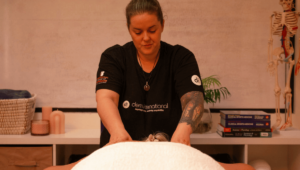If you’re considering a career in massage therapy but feeling overwhelmed by options, you’ve landed in the right place. Today, we unravel the difference between remedial massage vs deep tissue massage, exploring focus areas, techniques, and benefits along the way.
Whether you’re just starting your journey or already well-versed in the world of massage, understanding the nuances between these techniques is crucial to providing effective treatment and building a successful career or practice.
By the end of this article, you’ll better understand which approach resonates with you and your massage therapy goals.
What is remedial massage?
Remedial massage is a targeted therapeutic technique focused on treating specific injuries, tension, chronic pain and dysfunction due to injury, stress, or other conditions.
It involves applying pressure, kneading, and stretching soft tissue within the body. Unlike other types of relaxation massage, remedial therapy targets certain areas of the body with specific goals and outcomes in mind.
Remedial massage doesn’t necessarily involve hard pressure, especially if a person is recovering from an injury. The aim is to alleviate pain, improve circulation, and promote overall physical and mental wellbeing through a holistic approach to care.
How to learn remedial massage
Remedial massage therapists are highly trained professionals who use a wide range of techniques to assess and treat their clients’ needs.
When it comes to training and studying, they dive deeper than most others. Why? Because they need an in-depth understanding of the interaction between underlying tissues compared to other types of massage therapies. This advanced knowledge enables them to identify more complex issues and, if necessary, refer their clients to other care providers.
What is deep tissue massage?
Deep tissue massages is a complementary therapy that uses similar strokes and techniques as Swedish massage. The difference is in the pressure, that is firm enough to hit deeper tissue structures of the muscle and fascia. It can be uncomfortable, but deep tissue fans describe it as a “good pain.”
Despite the extra pressure, a deep tissue massage can be as relaxing as a Swedish body massage. It’s not uncommon to feel a few aches the day after, but rest assured, these are the “good aches” that signal your body is responding to the therapy.
Deep tissue massage is a great treatment option for athletes or anyone recuperating from intense physical activity, as it can help to speed up the recovery process.
Is remedial massage or deep tissue better for you?
It depends on the goal. Consider it this way; a remedial therapist is like a detective who finds the root cause of your pain, while a deep tissue therapist is more of a construction worker using force to tackle the issue.
Imagine a client comes to you with a shoulder injury. Sure, a deep tissue massage feels great, but it’s not laser-focused on the inner workings of the shoulder in the same way that remedial massage is. As a remedial therapist, you’ll focus on the nitty-gritty details of joints, ligaments, and muscles to find the cause, help with pain relief and guide your client’s recovery.
Study options for massage therapy
Now that you have a better picture of the difference between remedial therapy and deep tissue massage, let’s explore the study options for each.
Remedial massage therapy courses
To become a qualified remedial massage therapist in Australia, you must complete a diploma and 200 hours of supervised clinical practice.
The Demi International Diploma of Remedial Massage [HLT52015] is a comprehensive course that will have you job-ready in 12 months (full-time study) and will teach you the theory and practical skills you need to thrive in the massage industry.
Not only that, this diploma will give you valuable hands-on training and help you to unlock a higher salary than other therapists in your field.
Deep tissue therapy courses
To work as a deep tissue massage therapist in Australia, you’ll need to obtain a minimum Certificate IV in Massage Therapy and membership with an industry association. While this kind of qualification is a good starting point, pursuing a remedial massage qualification will enhance your skill set and give you a deeper knowledge of massage therapy.
Interested in becoming a massage therapist? Find out more about our remedial massage course.
Want to know more?
Book a chat with one of our friendly Course Advisors and get eyes on this guide: How to Become a Remedial Massage Therapist: A Career Guide and Tips for Success.







